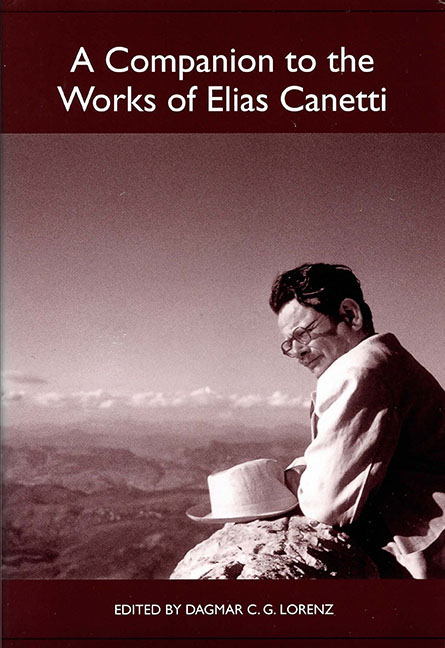Book contents
- Frontmatter
- Dedication
- Contents
- Canetti's Principal Works
- Abbreviations of Works Frequently Cited
- Introduction
- Canetti's Global Significance
- Writing and Language
- “The Deeper Nature of My German”: Mother Tongue, Subjectivity, and the Voice of the Other in Elias Canetti's Autobiography
- Elias Canetti's Attitude to Writers and Writings
- Canetti and the Question of Genre
- The Works: Themes and Genres
- Philosophy and Social Thought
- Historical Contexts
- Works Cited
- Notes on the Contributors
- Index
Canetti and the Question of Genre
from Writing and Language
Published online by Cambridge University Press: 28 April 2017
- Frontmatter
- Dedication
- Contents
- Canetti's Principal Works
- Abbreviations of Works Frequently Cited
- Introduction
- Canetti's Global Significance
- Writing and Language
- “The Deeper Nature of My German”: Mother Tongue, Subjectivity, and the Voice of the Other in Elias Canetti's Autobiography
- Elias Canetti's Attitude to Writers and Writings
- Canetti and the Question of Genre
- The Works: Themes and Genres
- Philosophy and Social Thought
- Historical Contexts
- Works Cited
- Notes on the Contributors
- Index
Summary
Ich nehme jede der Gattungen, in denen ich mich versuche, sehr ernst und wünsche mir, etwas zustande zu bringen, was so vorher noch nicht da war.
— Elias CanettiWhen Elias Canetti died in 1994 at the age of eighty-nine he left behind one novel, completed more than sixty years earlier at the age of twenty-six; three plays; several books of “Aufzeichnungen” — mixtures of notes, reminiscences, mini-essays, and aphorisms that cover more than fifty years from 1942 — an account of a journey to Marrakesh he made at the age of forty-nine but published thirteen years later; a volume of essays written largely in his sixties; a book of character portraits published shortly before he turned seventy; and a three-volume autobiography, the ripe product of his old age. Somewhere in between is the work of his middle years, which he began at twenty, which absorbed him completely from thirty, and which he published when he was fifty-five, Masse und Macht (1960), “the only masterpiece of crowd theory,” according to one historian of writing on the crowd. In an interview from 1965, Canetti mentions another novel, two more plays, and, of course, the second volume of Masse und Macht, long and often heralded, which he still intended to publish as late as 1972. These are all presumably found in his “Nachlaß,” along with his diaries, which promise to be voluminous.
We might divide Canetti's long creative life into three phases, each one associated with a big book. The first covers the 1930s and includes the first two plays, Die Komödie der Eitelkeit (1934) and Hochzeit (1931) and the novel Die Blendung (1935); the second extends to Masse und Macht, during which he wrote little else and published less — Die Befristeten (1952) and Fritz Wotruba (1955) are his only publications, although he did begin writing Aufzeichnungen and also completed the account of his Moroccan journey. All the rest belongs to the third phase, when he discovered what is arguably his greatest subject — himself. For, as he wrote in “Dialog mit dem grausamen Partner”: “Wer wirklich alles wissen will, lernt am besten an sich.”
- Type
- Chapter
- Information
- A Companion to the Works of Elias Canetti , pp. 89 - 104Publisher: Boydell & BrewerPrint publication year: 2004

